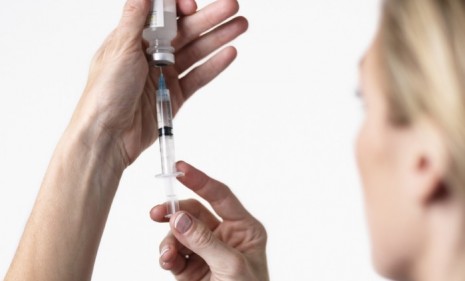A vaccine for cocaine addiction?
A new vaccine could immunize drug addicts from the high-inducing effects of specific narcotics

A free daily email with the biggest news stories of the day – and the best features from TheWeek.com
You are now subscribed
Your newsletter sign-up was successful
Scientists have discovered a vaccine that can theoretically immunize a drug addict against a high from cocaine, heroin, or other drugs. In tests on lab mice, researchers at Weill Cornell Medical College in New York were able to prevent injected cocaine from reaching the rodents' brains.
So how does this vaccine work?
To create the vaccine, scientists grafted a molecule very similar to cocaine onto a part of the common cold virus. They then injected the modified virus into the mice, whose bodies responded by producing antibodies. When the vaccinated mice were later injected with cocaine, their immune systems again reacted and the antibodies neutralized the cocaine. The result: The coked-up mice did not get high. The effects of a single vaccination lasted for at least 13 weeks.
The Week
Escape your echo chamber. Get the facts behind the news, plus analysis from multiple perspectives.

Sign up for The Week's Free Newsletters
From our morning news briefing to a weekly Good News Newsletter, get the best of The Week delivered directly to your inbox.
From our morning news briefing to a weekly Good News Newsletter, get the best of The Week delivered directly to your inbox.
Is this the first time something like this has been tried?
No, but the researchers behind the tests say it is the first single vaccination to successfully produce such results. "While other attempts at producing immunity against cocaine have been tried, this is the first that will likely not require multiple, expensive infusions, and that can move quickly into human trials," says Ronald Crystal, professor of genetic medicine at Weill Cornell Medical College.
Could this really help addicts?
Yes, says Crystal. "The vaccine may help them kick the habit because if they use cocaine, an immune response will destroy the drug before it reaches the brain's pleasure center." Not so fast, counters Jeffrey Kluger at Time. This vaccine is "not a panacea." If cocaine fails to give the desired buzz, then drug users will move onto other substances. Addiction is psychological, as well as physical, and "addicts are nothing if not resourceful."
A free daily email with the biggest news stories of the day – and the best features from TheWeek.com
Sources: Molecular Therapy, LiveScience, Time
-
 Film reviews: ‘Send Help’ and ‘Private Life’
Film reviews: ‘Send Help’ and ‘Private Life’Feature An office doormat is stranded alone with her awful boss and a frazzled therapist turns amateur murder investigator
-
 Movies to watch in February
Movies to watch in Februarythe week recommends Time travelers, multiverse hoppers and an Iraqi parable highlight this month’s offerings during the depths of winter
-
 ICE’s facial scanning is the tip of the surveillance iceberg
ICE’s facial scanning is the tip of the surveillance icebergIN THE SPOTLIGHT Federal troops are increasingly turning to high-tech tracking tools that push the boundaries of personal privacy